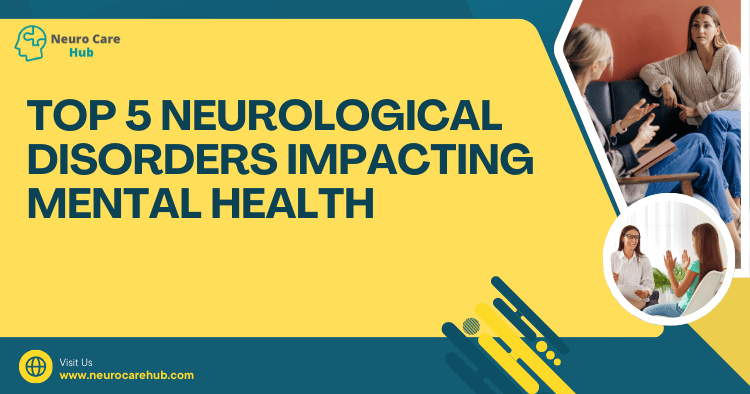Table of Contents
- Introduction
- 1. Alzheimer’s Disease
- 2. Parkinson’s Disease
- 3. Multiple Sclerosis (MS)
- 4. Epilepsy
- 5. Stroke
- Conclusion
- FAQs
Introduction
Neurological disorders and mental health issues are intricately connected, with each influencing the other in various ways. As we move into 2024 and beyond, understanding how these disorders impact mental health is crucial for effective treatment and support. This blog post explores the top five neurological disorders that significantly affect mental health, providing insights that can help recognize symptoms and seek appropriate treatment.
1. Alzheimer’s Disease
Alzheimer’s Disease is a progressive neurological disorder that primarily affects memory and cognitive function but can also lead to significant mental health challenges. As the disease progresses, individuals often experience changes in mood, increased anxiety, and depressive symptoms. The emotional toll on caregivers is equally substantial.
“The emotional toll of caring for someone with Alzheimer’s can be as challenging as the disease itself.”
How It Affects Mental Health
- Cognitive Decline: Memory loss and confusion can lead to frustration and sadness.
- Mood Changes: Patients may exhibit irritability, aggression, or withdrawal from social interactions.
- Depression: Studies have shown that people with Alzheimer’s are at a higher risk of developing depression.
Resources
For more information, visit Alzheimer’s Association.
2. Parkinson’s Disease
Parkinson’s Disease is primarily known for its motor symptoms, such as tremors and stiffness. However, it can also have a profound impact on mental health. Many individuals with Parkinson’s experience depression and anxiety, which can be exacerbated by the physical limitations imposed by the disease.
“Understanding the mental health implications of Parkinson’s is essential for comprehensive care.”
How It Affects Mental Health
- Depression: The prevalence of depression in Parkinson’s patients is significantly higher than in the general population, affecting approximately 40% of individuals with the disease.
- Anxiety Disorders: Feelings of apprehension and fear are common, often linked to the unpredictability of the disease’s progression.
- Cognitive Changes: Some individuals may experience cognitive decline or changes in their ability to think clearly, which can lead to feelings of frustration and helplessness.
Resources
Learn more about Parkinson’s Disease at Parkinson’s Foundation.
3. Multiple Sclerosis (MS)
Multiple Sclerosis is an autoimmune disease that affects the central nervous system. The unpredictable nature of MS can lead to various mental health challenges, including anxiety, depression, and cognitive dysfunction.
“Living with MS is not just a physical journey; it’s also an emotional one.”
How It Affects Mental Health
- Depression: Many MS patients report feelings of sadness and hopelessness, with research indicating that depression occurs in about 50% of patients.
- Cognitive Impairment: Memory issues and trouble concentrating can lead to frustration and diminished self-esteem.
- Social Withdrawal: The physical symptoms of MS can lead to isolation, exacerbating feelings of loneliness and anxiety.
Resources
For more insights, check out National Multiple Sclerosis Society.
4. Epilepsy
Epilepsy is characterized by recurrent seizures and can profoundly affect mental health. People with epilepsy may deal with social stigma, anxiety about seizures, and the side effects of anti-seizure medications, all contributing to mental health challenges.
“The stigma surrounding epilepsy can be as debilitating as the condition itself.”
How It Affects Mental Health
- Anxiety Disorders: Many individuals with epilepsy experience heightened anxiety, particularly around seizure triggers.
- Depression: The chronic nature of epilepsy, along with potential social isolation, can lead to depression in about 30% of people with the condition.
- Cognitive Challenges: Some may experience memory issues or learning difficulties due to the effects of seizures or medications.
Resources
Explore more about epilepsy at Epilepsy Foundation.
5. Stroke
A stroke occurs when blood flow to the brain is disrupted, leading to potential physical and cognitive impairments. The impact on mental health can be significant, with many stroke survivors facing depression, anxiety, and changes in personality.
“Recovery from a stroke is not just physical; it requires mental resilience and support.”
How It Affects Mental Health
- Post-Stroke Depression: Studies suggest that up to 30% of stroke survivors will experience depression, which can hinder recovery.
- Anxiety: Fear of future strokes and the challenges of rehabilitation can contribute to anxiety.
- Cognitive Decline: Cognitive impairments post-stroke can affect relationships and daily living, leading to frustration and emotional distress.
Resources
Learn more about stroke recovery at American Stroke Association.
Conclusion
Understanding the connection between neurological disorders and mental health is crucial for affected individuals and their families. Recognizing symptoms early and seeking appropriate help can lead to better management and improved quality of life. If you or someone you know is struggling with these issues, don’t hesitate to reach out for support.
“Awareness and education can empower families to navigate the complexities of neurological disorders and mental health.”
FAQs
Q: Can neurological disorders be treated?
A: Yes, many neurological disorders have treatment options available that can help manage symptoms and improve quality of life.
Q: How can I support someone with a neurological disorder?
A: Offer emotional support, educate yourself about the disorder, and encourage open communication about their feelings and experiences.
Q: Where can I find more information on managing mental health with neurological disorders?
A: Consult with healthcare professionals and visit reputable organizations like NAMI for resources and support.
By understanding and addressing the mental health implications of neurological disorders, we can foster a more supportive environment for those affected. Remember, you are not alone in this journey!
“Support and understanding can make a world of difference for individuals facing these challenges.”
Also look for insights on how caregivers enhance neuro care effectiveness at Top 5 Ways Caregivers Enhance Neuro Care Effectiveness.






